We may not have the course you’re looking for. If you enquire or give us a call on + 1-866 272 8822 and speak to our training experts, we may still be able to help with your training requirements.
Training Outcomes Within Your Budget!
We ensure quality, budget-alignment, and timely delivery by our expert instructors.
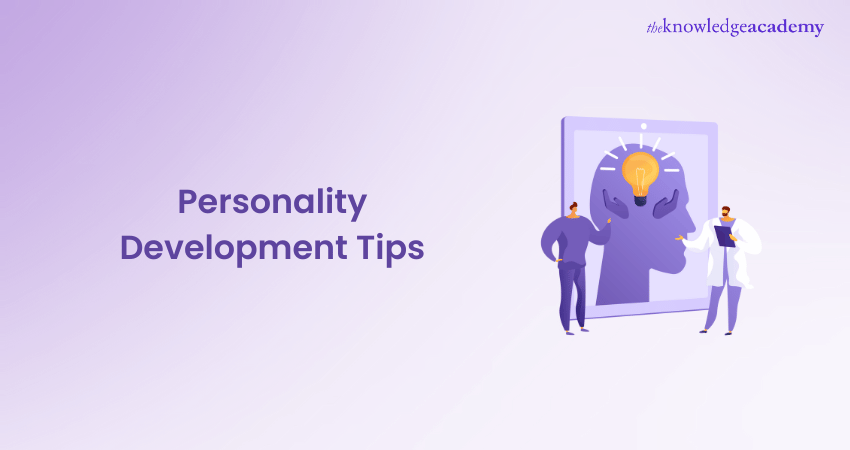
Personality Development Tips are essential guidelines that can help you enhance your inherent traits, communication skills, appearance, and overall confidence. These tips cater to various facets of personal growth, ranging from improving listening skills to adopting the right attire. Moreover, implementing these tips can lead to significantly better relationships, a successful career, and a more fulfilling life. This blog covers various Personality Development Tips to enhance your qualities, skills, and more that help you turn your weaknesses into strengths.
Table of Contents
1) Personality Development Tips
a) Understand yourself
b) Make your outlook positive
c) Project your opinion
d) Meet new people
e) Cultivate a habit of reading often
f) Improve your listening skills
g) Find your humorous side
h) Be a courteous individual
I) Develop great body language
2) Conclusion
Personality Development Tips
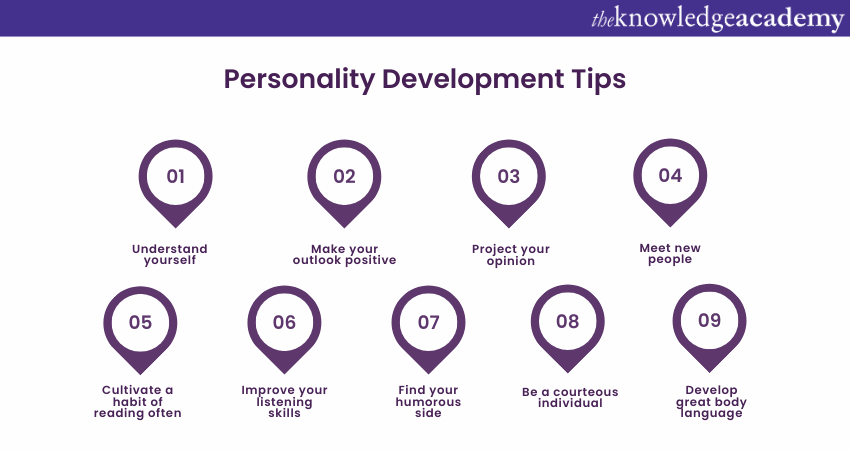
Personality is an essential aspect of a person's life. It defines how they manage different situations and achieve their goals and targets. Thus, Personal Development holds special significance to people. The following is a list of top 10 Personality Development Tips:
Understand yourself
The concept of understanding yourself comprises the following aspects:
a) Self-assessment: Personality Development begins with an honest evaluation of strengths, weaknesses, interests, and values. Recognising these aspects helps in setting realistic and aligned goals.
b) Identifying personality traits: Determining whether you are introverted or extroverted, analytical or creative, helps you make choices that align with your natural inclinations.
c) Emotional intelligence: Recognising and managing your emotions enhances interpersonal skills. Emotional self-awareness is the foundation for empathy, motivation, and self-regulation.
d) Values and beliefs: Personality Development also entails understanding what you hold dear, which helps guide behaviour and decision-making, leading to a more authentic and fulfilled life.
e) Goals and aspirations: Recognising what you want to achieve and setting clear, attainable goals can guide your personal and professional development journey.
f) Response to situations: Another facet of Personality Development is observing how you react to different situations, which provides insights into your coping mechanisms and areas that may need improvement.
g) Physical and mental health awareness: Recognising your physical and mental needs and maintaining a healthy balance contributes to overall well-being.
h) Utilising feedback: Seeking and reflecting on feedback from friends, family, or colleagues can provide valuable insights into how others perceive you.
i) Continuous learning and growth: Embracing lifelong learning and personal growth contributes to ongoing self-improvement and adaptability.
j) Reflection and mindfulness: Personality Development especially entails regular self-reflection, and mindfulness practices foster an in-depth understanding of oneself and one's place in the world.
Make your outlook positive
An individual can make their general outlook more positive with the following steps:
a) Focus on strengths: Concentrating on your abilities and positive traits rather than dwelling on weaknesses can lead to a more optimistic outlook.
b) Set realistic goals: Achievable and clear goals give direction and a sense of accomplishment, fostering a positive mindset.
c) Surround yourself with positivity: Engaging with positive people and environments can influence your outlook and encourage a more uplifting perspective.
d) Practice gratitude: Regularly acknowledging and appreciating the good things in life helps shift focus from negative aspects, cultivating a positive attitude.
e) Mindfulness and meditation: These practices can foster a calm and balanced mind, aiding in developing a more positive outlook on life.
f) Positive affirmations: Repeating positive statements and beliefs about oneself helps build self-confidence and a positive self-image.
g) Learn from mistakes: Instead of ruminating on failures, learning from them turns setbacks into growth opportunities, reinforcing a positive approach.
h) Limit negative exposure: Minimising exposure to negative media or pessimistic influences aids in maintaining a positive mindset.
i) Help others: Acts of kindness and helping others can boost your own positivity and satisfaction.
j) Invest in personal growth: Continual learning and self-improvement foster a sense of progress and positivity.
k) Embrace change: Seeing change as an opportunity rather than a threat encourages a more positive perspective.
Project your opinion
Projecting opinions is a vital element in the course of improving your Personality and, more specifically, self-esteem. Here is how an individual can practice having an opinion and projecting it:
a) Know your opinion: Understanding your standpoint on a subject is the first step. It involves research and reflection to form a well-thought-out opinion.
b) Effective communication: Articulating your thoughts clearly and confidently helps in projecting your opinion. Utilising verbal and non-verbal cues can aid in expressing yourself.
c) Active listening: Engage with others' viewpoints. By listening actively, you show respect for different opinions, which can make others more receptive to your perspective.
d) Be respectful: Disagree without being disagreeable. Approach conversations with empathy and understanding, even if you hold a differing viewpoint.
e) Use evidence: Support your opinion with facts or experiences. This not only strengthens your position but also builds credibility.
f) Adapt to your audience: Tailor your communication style to your audience, considering their background and interests to make your opinion more relatable.
g) Encourage dialogue: Foster an environment where others feel comfortable sharing their opinions. Open dialogue often leads to a richer understanding of a subject.
h) Accept feedback: Be open to criticism and feedback. It provides opportunities for growth and refinement of your viewpoints.
i) Be flexible: Recognise that opinions can change. Stay open to new information and adapt your opinions accordingly.
j) Practice: Like any skill, projecting your opinion effectively comes with practice. Engage in discussions, write about your opinions, and seek opportunities to share your thoughts.
Improve your self-confidence and enhance your relationships, by signing up for the Psychology of Personal Growth Training now!
Meet new people
A crucial part of developing your personality is the ability to meet and interact with new people. Here are some ways you can break the process down and make it easier to start broadening your social circle:
a) Be open-minded: Approach new people with curiosity and an open heart. This attitude helps in creating a welcoming environment for connections.
b) Utilise networking events: Attend social or professional gatherings to meet like-minded individuals. These can be valuable opportunities to expand your network.
c) Embrace diversity: Seek out people from different cultures, professions, or walks of life. It can lead to a broader perspective and enriching experiences.
d) Practice good body language: Maintain eye contact and use open body language to show interest and create a friendly impression.
e) Ask open-ended questions: Encourage dialogue by asking questions that require an answer beyond yes or no.
f) Follow up: If you connect with someone, take the initiative to follow up and nurture that relationship.
g) Show genuine interest: Listen actively and show interest in the other person's story, values, or opinions.
h) Build confidence: Gradually step out of your comfort zone if meeting new people makes you nervous. Start with smaller, more familiar settings.
i) Use technology: Online platforms and social media can be powerful tools to connect with people globally.
j) Reflect and learn: After meeting someone new, reflect on the interaction to understand what went well and what you can improve for future encounters.
Cultivate a habit of reading often
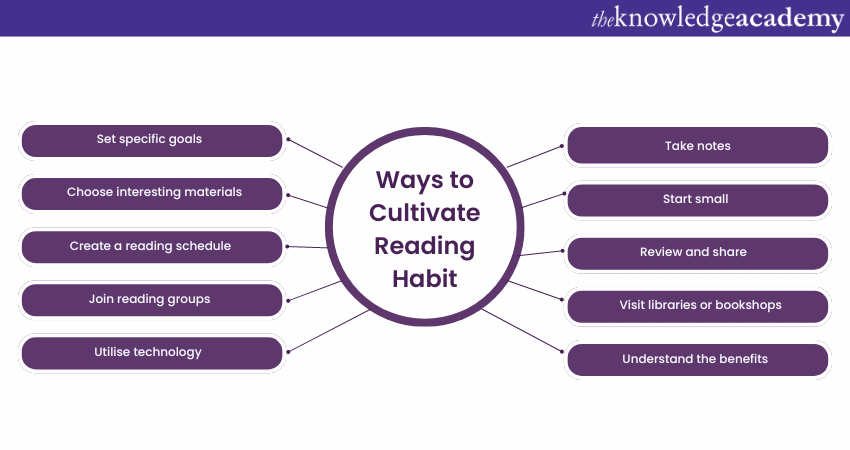
As American Entrepreneur Jim Rohn stated, “Reading books makes you rise above the ordinary”. You end up not only reading a book, but also another story, an opinion, another world. Reading a book is very much akin to travelling the world without a single step forward. Here are some ways which you can utilise to cultivate a rewarding habit of reading:
a) Set specific goals: Establish clear and achievable reading targets. Whether it's a particular number of pages or minutes per day, having a goal fosters commitment.
b) Choose interesting materials: Select books, articles, or genres that interest you. Reading something you enjoy makes the habit more pleasurable.
c) Create a reading schedule: Dedicate specific times for reading. Whether during breaks or before bed, a regular schedule reinforces the habit.
d) Join reading groups: Connecting with fellow readers can provide motivation and new perspectives on what to read.
e) Utilise technology: E-books, audiobooks, and reading apps make reading accessible, even on the go.
f) Take notes: If applicable, jot down interesting points, quotes, or reflections. This enhances understanding and engagement with the material.
g) Start small: If you're new to reading regularly, start with shorter pieces and gradually increase complexity as your comfort grows.
h) Review and share: Discussing what you've read with friends or writing reviews helps in consolidating understanding and adds a social element to the habit.
i) Visit libraries or bookshops: Regular visits to places filled with books can inspire and strengthen the reading habit.
j) Understand the benefits: Recognise that reading expands knowledge, improves language skills, and fosters creativity, adding further motivation to the habit.
Learn to lend an attentive ear to others, by signing up for the Active Listening Skills course now!
Improve your listening skills
Listening skills are a vital and understated element of your personality and the quality of your interpersonal relationship skills. Here are some great ways how you can enhance your listening skills:
a) Give full attention: Focus entirely on the speaker without distractions. It shows respect and enhances your ability to understand the message.
b) Maintain eye contact: Engaging eye contact demonstrates interest and helps you stay connected with the conversation.
c) Use non-verbal cues: Nodding or smiling can encourage the speaker and indicate that you're actively listening.
d) Avoid interrupting: Allow the speaker to complete their thoughts. Interrupting can disrupt the flow of communication.
e) Ask relevant questions: Inquire to clarify any doubts but wait for appropriate pauses to do so.
f) Provide feedback: Summarise or paraphrase what you've heard to ensure you've understood correctly.
g) Control judgements: Refrain from making premature judgments or assumptions. Listen fully before forming an opinion.
h) Improve concentration: Practice focusing on the present moment and what's being said. It helps in retaining information.
i) Recognise emotions: Pay attention to the speaker's tone and body language to understand underlying emotions.
j) Practice empathetic listening: Try to understand the speaker's perspective and feelings without imposing your views.
h) Continue learning: Attend workshops or read about effective listening techniques to continue improving your skills.
Find your humorous side
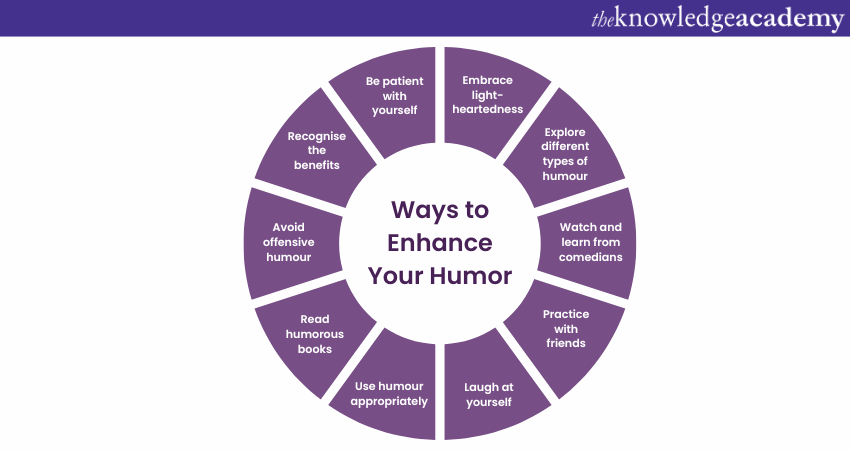
A humorous side to your personality shows that you know when not to take life too seriously. Discovering your humorous side does a significant amount of good for not just you, but also for your family, friends and professional relationships. Here are the various ways how you can find your ‘funny bone’:
a) Embrace light-heartedness: Recognising that life doesn't always need to be taken so seriously can open the door to humour and joy.
b) Explore different types of humour: Experiment with various forms like wordplay, self-deprecating humour, or observational comedy to find what resonates with you.
c) Watch and learn from comedians: Analyse how professionals use timing, tone, and content to create laughter.
d) Practice with friends: Share jokes or funny stories with friends and observe their reactions. It's a safe space to hone your humorous side.
e) Laugh at yourself: Being able to laugh at your own mistakes or quirks can make you more relatable and shows self-confidence.
f) Use humour appropriately: Understand when humour is suitable and when it might be best to refrain, especially in sensitive or formal situations.
g) Read humorous books: Engaging with written comedy can help you appreciate different styles of humour and inspire your own.
h) Avoid offensive humour: Strive to keep your humour inclusive and avoid topics that might offend others.
i) Recognise the benefits: Humour can relieve stress, enhance social bonds, and improve overall well-being.
j) Be patient with yourself: Developing a humorous side can take time and practice. Embrace the process and don't be too hard on yourself if a joke doesn't land.
Make your outlook more positive, by signing up for the Confidence Building Training now!
Be a courteous individual
Courteousy takes people a long way ahead in life. A courteous individual has a personality comprising of various aspects, which are listed as shown below:
a) Show respect: Treat others with dignity and consideration, regardless of their status or background. Respect forms the foundation of courteous behaviour.
b) Use polite language: Employing 'please,' 'thank you,' and other polite expressions demonstrates thoughtfulness and good manners.
c) Be punctual: Value other people's time by arriving promptly for appointments or meetings.
d) Listen actively: Give full attention to others when they speak, showing that their opinions matter to you.
e) Offer assistance: Helping others, even in small ways, is a mark of a courteous individual.
f) Respect privacy: Understand and maintain appropriate boundaries in personal and professional relationships.
g) Avoid interruptions: Allow others to speak without cutting them off, demonstrating that you value their input.
h) Mind your body language: Non-verbal cues like a friendly smile or open posture can convey warmth and approachability.
i) Adapt to cultural differences: Being aware of and adapting to various cultural norms and etiquettes shows sensitivity and respect.
j) Acknowledge mistakes and apologise: If you've made a mistake, acknowledging it and apologising shows integrity and humility.
k) Lead by example: Exhibit courteous behaviour consistently, encouraging others to do the same.
Improve your skills in non-verbal communication, by signing up for our Understanding Body Language Training now!
Develop great body language
A difference in posture and the tone of your voice can make a difference in your day, in your self-esteem and overall well-being. Here are some great tips how you can make tweaks and readjustments in the process of your Personality Development:
a) Maintain eye contact: Consistent eye contact conveys confidence and interest in the conversation, enhancing engagement with others.
b) Use open postures: Avoid crossing arms or legs, as open postures signal approachability and willingness to connect.
c) Mind your facial expressions: Smiles and appropriate facial reactions demonstrate attentiveness and empathy.
d) Monitor your tone: The pitch and modulation of your voice can convey various emotions and intentions, so be aware of how you sound.
e) Avoid fidgeting: Unnecessary movements or fidgeting can be distracting and may convey nervousness or disinterest.
f) Respect personal space: Be mindful of others' comfort zones and adjust your physical distance accordingly.
g) Incorporate appropriate gestures: Hand movements can emphasise points and add dynamism to your communication, but they should be natural and not excessive.
h) Adopt a confident stance: Standing or sitting upright shows self-assurance and energy, while slouching may imply disengagement or insecurity.
i) Mirror body language: Subtly mirroring the body language of the person you're interacting with can build rapport and foster understanding.
j) Observe others: Learn from those who exhibit great body language and apply those insights to your own behaviour.
k) Seek feedback: Ask your trusted friends or colleagues for feedback on your body language to identify areas for improvement.
Key aspects of Personality
Personality comprises of a structure of 10 key aspects, described as follows:
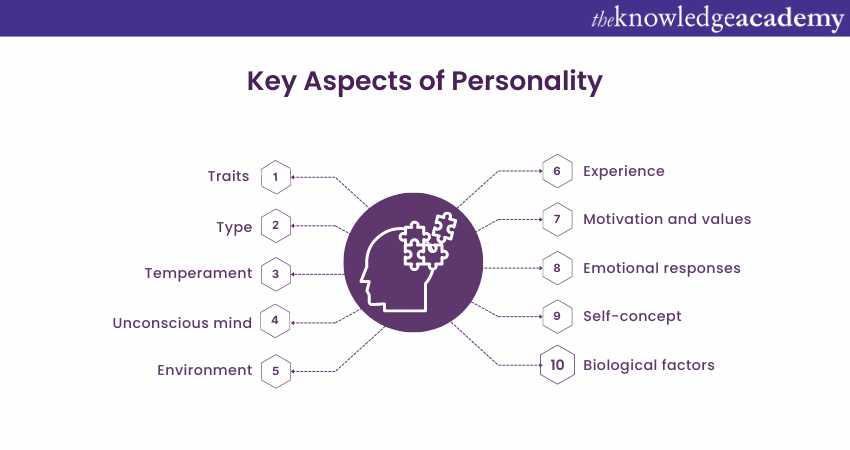
a) Traits: These are distinctive qualities or characteristics that form the basis of Personality Development. Traits like openness, conscientiousness, and agreeableness help categorise individual behaviours.
b) Type: Personality types are broad categories that group people based on similar characteristics, such as introverts and extroverts.
c) Temperament: Rooted in biology, temperament refers to inherent patterns of mood, activity, or emotional responsiveness.
d) Unconscious mind: Influences from the unconscious mind, including instincts, play a vital role in shaping an individual during their Personality Development process.
e) Environment: Social, cultural, and familial factors greatly impact Personality Development.
f) Experience: Life experiences, education, and travel influence adaptability and worldview, contributing to Personality Development.
g) Motivation and values: What motivates a person and the values they hold dear often guide behaviour and decision-making processes.
h) Emotional responses: How a person reacts emotionally to situations contributes to the development of their unique personality.
i) Self-concept: An individual’s growing perception of themselves forms a crucial part of their Personality Development process.
j) Biological factors: Genetic influences and physical appearance may also play a part in Personality Development.
Conclusion
Personality Development Tips are vital tools for enhancing one's interactions, confidence, and overall outlook on life. They encompass various aspects, from body language to attire, and require continuous practice and awareness. Implementing these tips can lead to a more enriched and fulfilling personal and professional life.
Learn about personality traits and individual differences, by signing up for the Introduction to Psychology of Personality now!
Frequently Asked Questions
Upcoming Business Skills Resources Batches & Dates
Date
 Time Management Training
Time Management Training
Fri 10th Jan 2025
Fri 14th Feb 2025
Fri 11th Apr 2025
Fri 23rd May 2025
Fri 8th Aug 2025
Fri 26th Sep 2025
Fri 21st Nov 2025







 Top Rated Course
Top Rated Course



 If you wish to make any changes to your course, please
If you wish to make any changes to your course, please


